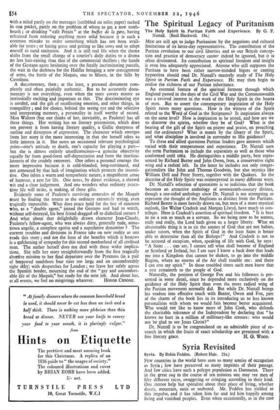The Spiritual Legacy of Puritanism
The Holy Spirit in Puritan Faith and Experience. By G. F. Nuttall. (Basil Blackwell. 15s.)
MEN are still apt to judge Puritanism by the negations and cultural limitations of its latter-day representatives. The contribution of the Puritan revolution to our civil liberties and to our British concep- tion and practice of democracy cannot indeed be ignored, but it is often discounted. Its contribution to spiritual freedom and insight is even less adequately appreciated. Anyone who still supposes the Puritans to have been either narrow-minded bigots or canting hypocrites should read Dr. Nuttall's masterly study of The Holy Spirit in Puritan Faith and Experience. He may then begin to realise the richness of our Puritan inheritance.
An essential feature of the spiritual ferment through which England passed in the days of the Civil War and the Commonwealth was a revived interest in the work of the Holy Spirit in the hearts of men. But to assert the contemporary inspiration of the Holy Spirit raises many questions. How is the witness of the Spirit related to the Word of God in the Scriptures? Is inspiration always on the same level? How is inspiration to be tested, and how are we to discover the spirits, whether they be of God? What is the bearing of the gift of the Spirit on prayer and praise, on preaching and the ordinances? What is meant by the liberty of the Spirit, and what discipline is involved in surrender to His guidance?
To these and allied questions Puritan leaders gave answers which varied with their temperament and experience. Dr. Nuttall uses the term Puritanism to include the separatists as well as those who conformed until x662. He distinguishes a middle party, best repre- sented by Richard Baxter and John Owen, fron, a conservative right wing and a radical left. In the latter he includes not only congre- gationalists like John and Thomas Goodwin, but also mystics like William Dell and Peter Sterry, together with the Quakers. So the doctrine of the Holy Spirit was reinterpreted in many different ways.
Dr. Nuttall's selection of quotations is so judicious that the book becomes an attractive anthology of seventeenth-century divines, though a one-sided anthology since Dr. Nuttall is not attempting to represent the thought of the Anglicans as distinct from the Puritans. Richard Baxter is most heavily drawn on, but men of a more mystical outlook, like Walter Cradock and Morgan Llwyd, have much to con- tribute. Here is Cradock's assertion of spiritual freedom. " It is base to tie a son as much as a servant. So we being now to be sonnes, truly and really, the Lord bath given us a larger liberty. What an abominable thing it is to tie the sonnes of God that are not babies, under tutors, when the Spirit of God in the least Saint is better able to determine than all the Bishops!" And Cradock is not to be accused of escapism, when, speaking of life with God, he says: " A Saint . . . can say, I cannot tell what shall become of England or Scotland or Ireland, but I am sure I know a back door that leads me into a Kingdom that cannot be shaken, to go into the middle Region, where no storms of the Air shall trouble me : and there I can rest my spirit." In those troubled times such men knew that a rest remaineth to the people of God.
Naturally, the position of George Fox and his followers is pre- sented in some detail, since he depended more exclusively on the guidance of the Holy Spirit than even the more radical wing of the Puritan movement normally did. But while Dr. Nuttall brings his readers into effective touch with Baxter, Owen and Fox, part of the charm of the book lies in its introducing us to less known personalities with whom we would fain become better acquainted. Who would not like to know more of John Cook, who defends the charitable tolerance of the Independent by declaring that " he knows no hurt in a million of millenary-like errours: who would not be glad to see Jesus Christ?"
Dr. Nuttall is to be congratulated on an admirable piece of re- search in which the fruits of exact scholarship are presented with a


































 Previous page
Previous page